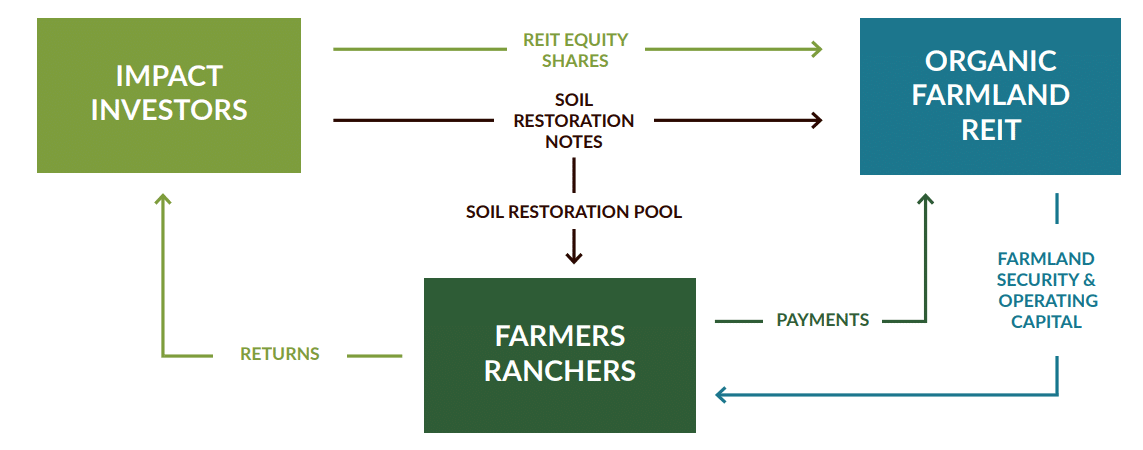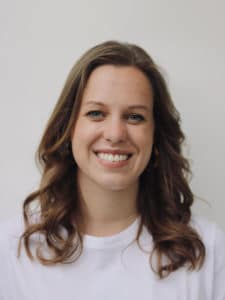| Title | Iroquois Valley Farmland REIT (Iroquois) |
| Country/Location | United States |
| Size of Investment | USD 115 million (AUM) |
| Revenue Model | Long-term lease and mortgage interest payments from organic farmers |
| Private Investment/Finance Structure | Real Estate Investment Trust |
| Public/Philanthropic Investment | Five US Government grants to date totaling USD 1.6 million, pending success of farmer projects that Iroquois is supporting |
| Env/Social Impact | Organic Food Production, Land Security for Farmers, Improved Soil Health, Water Quality Improvement, Climate Change Resilience |
Summary
Iroquois Valley Farmland REIT provides young farmers in the US with land security by buying farmland and leasing the land to them at affordable rates. These farmers then transition the land to certified organic farmland. The REIT is one of the first private companies in North America to connect investors directly to a portfolio of organic farmland and has a predominantly retail investor base.
Background
There is currently a ‘farming succession crisis’ in the US, where younger farmers are not taking over from older generations when they retire or pass away. The average age of the US farmer is 58 and has been climbing steadily for the past three decades [1]. The main reason for this is a lack of land access; farmland prices have grown by 260% between 1990 and 2020 [2].
In addition to being socially unsustainable, there is an argument that this lack of land access ultimately affects long-term factors like soil health, water quality and biodiversity. For example, farmers are 8.3% less likely to plant cover crops on land they rent on terms less than five years [3].
Dona Holmes, Managing Director at Iroquois, comments on the need for such practices; “Without farmers using methods like cover crops and minimal tillage, many experts estimate that the Earth only has about 60 years of topsoil remaining”.

Donna Holmes, Managing Director at Iroquois Valley Farmland REIT
Founded in 2007, Iroquois is a Real Estate Investment Trust that provides land access to those who want to farm organically. It buys conventional farmland and provides long-term lending to farmers, who then transition the land to organic farming. It also buys existing organic farmland for those who want to expand their existing operations. Currently, its portfolio has 100 farmland investments across 30,000 acres and 16 states, predominantly in the Midwest.
Working with Farmers
Iroquois starts its process with farmers, typically through referrals or word of mouth, who have already identified a plot of land that they want to farm organically. Iroquois then undertakes a due diligence process that focuses on the farmer. “We start with the farmer and not the land,” says Holmes.
To be eligible for financing, farmers must already be willing to commit to an entirely organic farming approach, in alignment with the USDA certification process. To reduce credit risk, Iroquois prefers to work with those who have farming experience– either existing farmland owners, renters, or employees – usually with organic production, and a viable business plan for the land they intend to lease.
While the majority of its portfolio comes from existing farming families, roughly 30% are first generation farmers. Nearly 65% are born after 1980, and 70% of its farms have women in decision-making roles.
Iroquois’ eligibility criteria for farmland are relatively flexible, with its portfolio including various farm types such as multi-year crop rotations, dairy farming, and integrated livestock operations. While most of its portfolio is concentrated in the Midwest, Iroquois also partners with farmers in the Northeast, Northwest, and Arizona.
The due diligence and onboarding process can vary in time depending on the preparedness of the farmer and the capacity of the team, and completes roughly 20 deals a year. When Iroquois has completed this review, it uses its fundraised capital to purchase the farm in question, and provides access to the farmer via three financial options:
- Leases with six-year terms and automatic renewal provisions. The rent consists of two components. The base rent is a percentage of the land’s purchase price, and for row crop farmers, there is also a variable rent payment when the farmer’s revenue exceeds three times the base rent. Leases make up about 80% of Iroquois’s lending exposure.
- Mortgages with ten-year terms and renewal provisions. In the first five years, farmers make interest-only payments, with capital repayments starting afterwards. Iroquois introduced this product in 2016 to allow them to operate in States which do not allow corporations to own farmland. In those cases, Iroquois acts as a mortgage provider to farmers. This has proven relatively popular and makes up nearly 20% of its lending portfolio.
- Lines of credit. These are operational loans for farmers who need support in buying items like seeds. This makes up 2-4% of its lending exposure.
Holmes remarks: “Farmers work with Iroquois because the company offers a lot of flexibility on terms of borrowing, especially during the difficult three-year transition period.”
Part of Iroquois’ mission is to provide land security to its farmers. Once a farmer has leased land for seven years, they have the ongoing opportunity to purchase the farm in question. However, there is no obligation to purchase and Holmes notes that the majority of its farmers who have reached this tenure have remained with their secure rental agreements, either due to a lack of affordability or the farmers’ longer-term ambition to purchase more land. Since 2007, Iroquois has sold seven farms resulting from farmer insolvency.
Working with Investors
Iroquois is one of the first private companies in North America to connect investors directly to a portfolio of organic farmland. It seeks investors who are willing to offer ‘patient capital’ for longer periods of time.
See below graphic for the investment structure:

Source: Iroquois Valley Farmland REIT
Working with Investors
Iroquois aims for a large and diverse investor base as part of its investor strategy. It currently has around 850 investors across 50 states and countries. Some 75% are retail investors, and the remaining quarter come from family offices, foundations, and other institutional investors. Says Benz: “Not only are our farmers diverse in age, but our investors are as well; our youngest investor is 23 and the oldest is 88 years old. The average investment size is USD 100,000.”
Iroquois has two main capital raising channels using equity and debt:
- REIT Equity Shares. These are issued through Direct Public Offerings (DPOs) and can be purchased with a minimum investment value of approximately USD 10,000. Shareholders can exit after five years. This option is available to both retail and accredited investors as defined by the SEC. Share prices are based on the land value of the farms and dividends are based on the annual profitability of its portfolio. Approximately 70% of Iroquois’s capital comes from these shares, and shareholders expect a return of 5-7% per annum
- Regeneration Notes. These are impact promissory notes that offer a 0.5-3.0% return, with varying lengths of three, five, or seven-year terms. The minimum investment is USD 25,000, and they are only available to SEC accredited investors. A portion of the stated interest on the Notes funds discounts on mortgage interest rates for socially disadvantaged farmers as defined by the United States Department of Agriculture.
Both the equity shares and the notes are available via tax-deferred retirement accounts, such as IRAs or 401(k)s. “The long-term nature of farmland investment is a natural match for the time horizon of most retirement accounts,” says Holmes.

Lacey Benz, Manager, Investor Relations , Iroquois Valley Farmland REIT
Additionally, in 2022, Iroquois launched a charitable foundation called Healing Soils Foundation. Healing Soils will enable investors and others to make tax-deductible contributions to help more farmers transition to practices that improve soil health.
Measuring Outcomes
Iroquois aims for all of the farmers in its portfolio to transition to organic farming using the USDA organic standards and certification process. The process takes three year, with annual inspections for monitoring the status of the farms carried out thereafter. Currently 50% of the acres in the Iroquois farming portfolio are certified as organic and the rest are in transition.
There are other certification standards that Iroquois promotes to its farmers to further demonstrate their commitment to regenerative farming, such as Regenerative Organic Certified, Bee Better Certified, or Savory Hub membership.
Regarding soil health practices, Iroquois also surveys the farms on an annual basis with self-reporting and site visits. Currently
- 100% are planting cover crops
- 80% are using reducing tillage or no tillage practices, and
- 85% are measuring soil organic matter on a yearly basis.
Challenges
Iroquois launched as a Limited Liability Company (LLC), but found that this legal structure was not suitable for its aim to have a large and diverse investor base. The management team decided to change Iroquois’s legal entity status to a REIT in 2016 to allow for an unlimited number of investors and simplify the investors’ tax reporting.
Another challenge is that Iroquois’ portfolio is often determined by the weather. Most of the farms are located in the Midwest, which exposes Iroquois and its investors to a geographical risk.
What’s Next
Iroquois is looking for ways to make organic farming more profitable for farmers. It is exploring new revenue streams, including renewable energy partnerships on their land, ecosystem credits, and other means for farmers to be paid for the improvements they make to the environment.
Updated as of October 2024
Sources:
- UCSUSA (2020) National Soil Erosion Rates on Track to Repeat Dust Bowl-era Losses Eight Times Over
- US Department of Agriculture (2024) Farmland Value
- AgEcon Search (2014) Do farmers treat rented land differently than the land they own? A fixed effects model of farmer’s decision to adopt conservation practices on owned and rented land
- Interview with Donna Holmes, Managing Director and Lacey Benz, Manager, Investor Relations at Iroquois Valley Farmland REIT